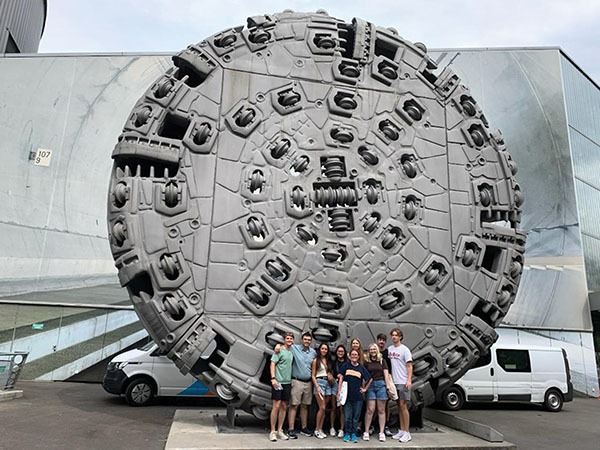
Young Engineers Evaluate Reliability
My recently completed Europe class for Univ. of Tennessee, College of Engineering students provides global perspectives in reliability.
Reliability in Europe is called “Zuverlassigkeit” and maintenance is “instalthaltung.” However, the importance and benefits are universal. During the three-week course (with teaching contact hours to qualify for a three-credit semester course, two exams, a book to read, and multiple site visits) students learn how to make a “big picture” evaluation of things they learn and put it into practice in a business environment in any industry.
This process integrates engineering knowledge and concepts with things that need to be understood in real-world situations to enable continuous improvement and implementation success. Multiple companies are visited to support learning and discussion. Key points discussed include:
• What role has engineering played in innovations and progress?
• What is operational excellence? How do you attain it?
• What’s the difference between reliability, maintainability, lean manufacturing, TPM, RCM, Six Sigma, and other tools and techniques, how do they fit together, and why/when to use what?
• What do the best companies do differently?
• What is the impact of size, volume, industry type, discrete/process/job shop layouts, and complexity on operational excellence?
• What are the elements of a successful continuous-improvement process and how do you implement/sustain it?
• What is the role of leadership and individuals?
• What impact does improved reliability have on safety, equipment uptime, quality, culture, and cost?
• If you spend a day at a factory, how do you know if it’s efficient and effective?
Examples of visits and in-plant discussions included:
• Mercedes Benz Production Facility, Sindelfingen, Germany: The complex produces numerous vehicle models and is the competence center for the manufacture of electric vehicles in the upper/luxury classes. It is also the site for corporate research, development, and design.
• Trumpf Smart Factory, Ditzingen (near Stuttgart) Germany: The company manufactures machines for bending, punching, combined punch and laser processing/cutting, and welding applications. We spent most of our time learning about their laser technology capabilities. The trip always includes a family-owned German company to help students understand factors involved in research investment and long-term decision making in a private company, compared with it’s done in public companies.
• ABB Digital, Baden-Dättwil , Switzerland: The company is a technology leader in electrification and automation. At this facility we were with the Digital Business Line (Process Industries Division), mainly because of our interest in transitioning to Industry 4.0. After a digital business overview, we discussed items such as industries and digital solutions, process performance and sustainability, measurement, and analytics with interactive demonstrations.
• Holcim, Siggenthal-Würenlingen, Switzerland: We were provided a “raw materials to finished product” tour of this cement factory. The company is a global leader in the construction-materials industry, with a presence in more than 70 countries.
Near the conclusion of the course, I asked the students to write a page answering the question, “Realizing that the world is going digital (Industry 4.0), why and how is reliability as or more relevant in the upcoming years?” I mainly wanted to collect their thoughts on what they think is important, since this also represents our future in reliability. Here are some of their comments:
• Reliability will increase in importance as the world becomes more digital because, as industry becomes more connected and reliant on centralized systems, the reliability of that system will become even more critical.
• When considering the world’s increasing dependence on digitalization, reliability becomes more eminent. Any failures or functionality errors that occur will have an increasingly greater impact on safety, productivity, and user confidence.
• People are wary of the potential dangers of the digital age and are hesitant to take steps forward. Companies need to show their clients and employees that their products are physically safe and cyber secure. We will always need people who know how to fix things (hands-on) and problem solve.
• The lack of people available to work has accelerated digitalization and automation. The ability to manage this acceleration and work with automation (people with cobots and technologies) will become vital for long-term success.
• Companies need to better understand what’s lost (value of in-person interactions) as they get more digital. Many problems with reliability come from a lack of communication and comprehension. Businesses that have a healthy blend of in-person and digital communication will thrive in ways other companies can’t. Technology can do a lot to help reliability, but it can’t help shape the supporting culture.
• Companies need to be able to make sure that their consumers are safe using their highly digitalized products. Overall, technology has been beneficial to our society, but has also caused the need for more reliability and protection for consumers.
• As the world becomes more centered around ideas such as artificial intelligence, machine learning, and Industry 5.0, even more development will need to be done for products and machines to remain reliable and maintainable.
• Robots and machines can operate as long as needed to keep up with demand. Because of this high efficiency, they need to be continuously monitored and have a robust maintainability process.
• As the world moves toward automation and digitalization, there will still be a need for human interaction during the processes to monitor systems and perform repairs to quickly return assets to operation.
Reliability/maintainability will become increasingly more important as digitalization and automation increase in the transition toward Industry 4.0/5.0. Particularly important will be the need to be human-centric, i.e., using technologies to help people optimize their innovation and decision-making skills on a daily basis. EP
Klaus M. Blache | August 1, 2023
Based in Knoxville, Klaus M. Blache is director of the Reliability & Maintainability Center at the Univ. of Tennessee, and a research professor in the College of Engineering. Contact him at [email protected].
The post "Young Engineers Evaluate Reliability" appeared first on Efficient Plant








0 Comments